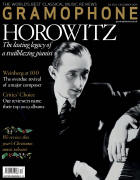Texte paru dans: / Appeared in: |
|
|
Outil de traduction (Très approximatif) |
|
|
Reviewer: David Vickers Early 18th-century Italian opera companies often cast female voices in male roles, and sometimes castratos took female roles according to the vicissitudes of local circumstances. For example, during some periods female performers were forbidden on stage in Rome, but throughout the rest of Europe good female singers were the preferred option for leading male characters if no suitable castrato was available. Beyond that, there are plenty of Baroque operas in which characters disguise themselves as someone of the opposite gender. Such fluidity inspires a playful double album by Vivica Genaux and Lawrence Zazzo, who take turns to sing every concei Zazzo sings Amastre’s wistful ‘Cagion son io’ (Handel’s Serse) and Bradamante’s furious ‘È gelosia’ (Handel’s Alcina) – both female characters disguised as men that the countertenor is unlikely to perform on stage. On the other hand, Genaux’s propulsive ‘Nel profondo cieco mondo’ from Vivaldi’s Orlando furioso sounds as if her unstable title-hero belongs on stage. These are heard in context alongside much less familiar music. Zazzo’s spirited enactment of Tamiri’s ‘Tu mi disprezzi’ from Lampugnani’s setting of Metastasio’s libretto Semiramide riconosciuta (Rome, 1741) is juxtaposed directly with Genaux’s gentle dialogue with soft pastoral flutes and horns in Semiramide’s ‘Il pastor se torna aprile’ from Porpora’s version revived at Naples in 1739. Metastasio’s drama Siroe, re di Persia forms a strand throughout proceedings: there is a buoyant sinfonia featuring horns from Hasse’s 1733 setting, Genaux’s energetic accounts of Emira’s furious outbursts composed by Galuppi (1754) and Traetta (1767), Zazzo’s pathosladen singing as the imprisoned hero in Handel’s version (1728), and his limpid singing in two arias by Wagenseil (1748) – one for the primo uomo and another for the prima donna. Wolfgang Katschner and Lautten Compagney provide lean, skilfully balanced and astute theatrical support. Clever artistic programming means that each half starts with a striking overture and culminates in an engaging duet, via a series of vividly contrasting musical styles, orchestral colours, speeds and moods.
|
|




